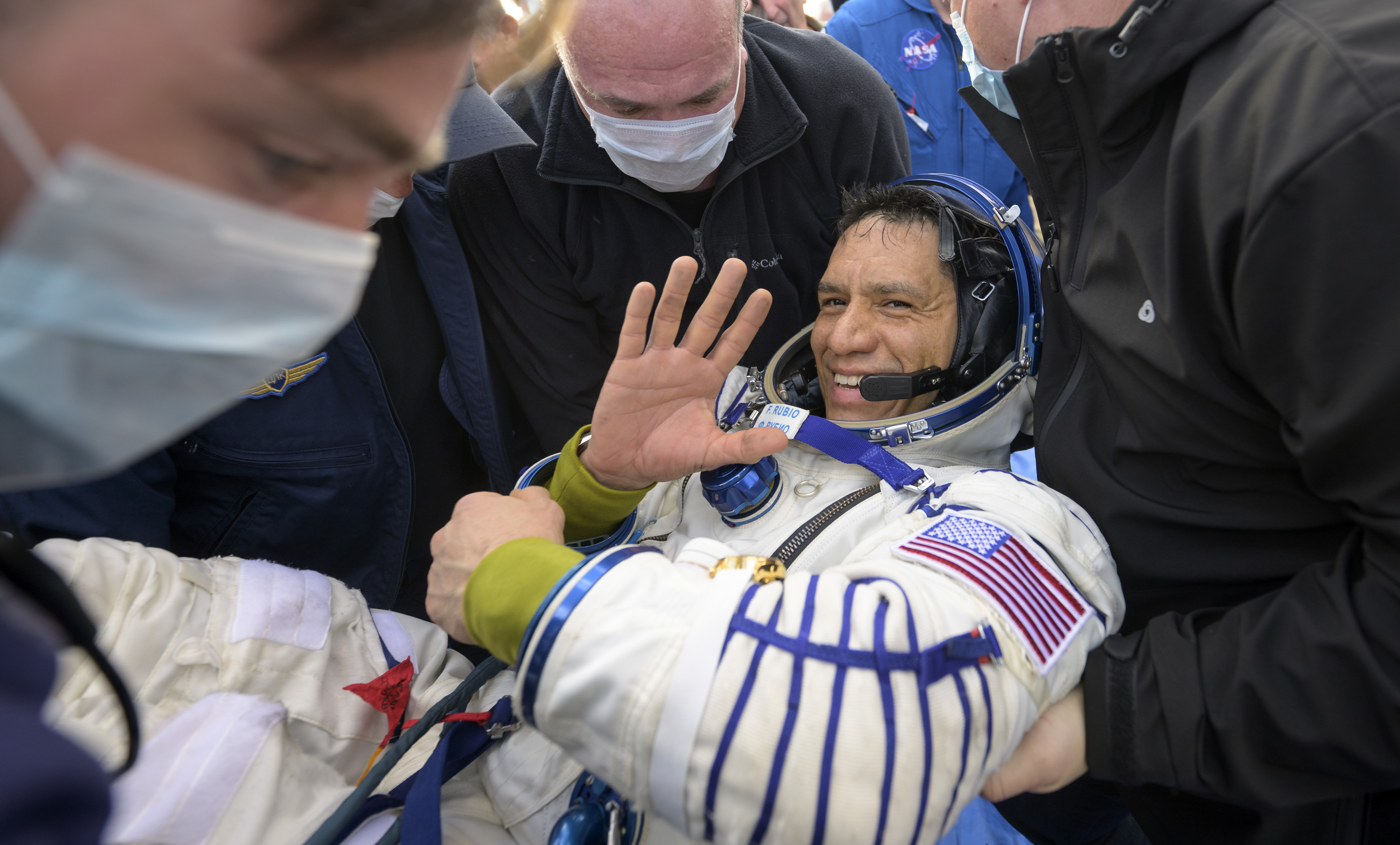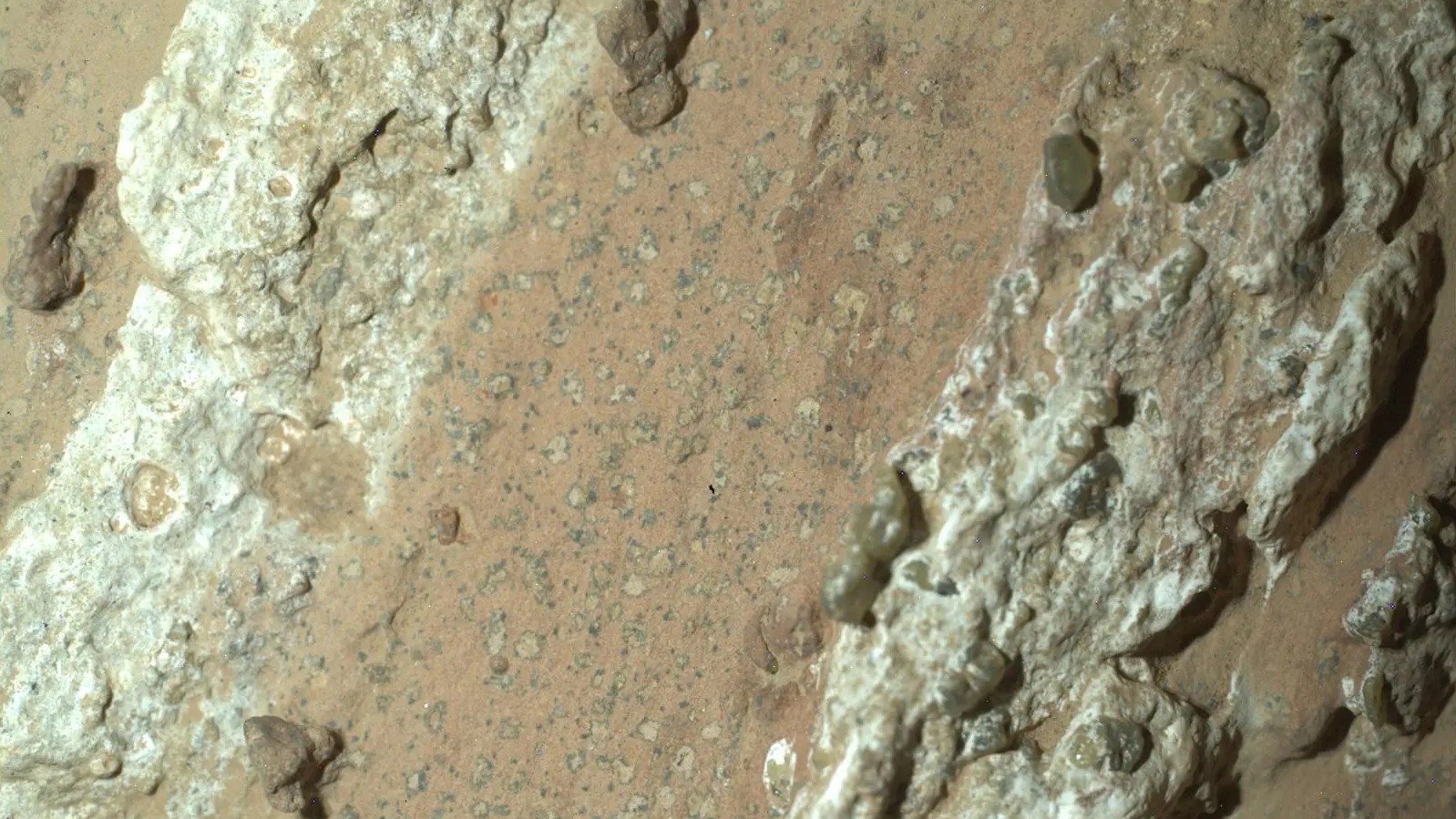Astronauts return after circling Earth thousands of times while stuck in space
The astronauts were stranded on the International Space Station after their return capsule was hit by space junk

A free daily email with the biggest news stories of the day – and the best features from TheWeek.com
You are now subscribed
Your newsletter sign-up was successful
One American and two Russian astronauts have finally returned to Earth after being stuck in space for over a year.
Nasa's Frank Rubio and the Roscosmos cosmonauts Sergey Prokopyev and Dmitri Petelin landed in a remote area of Kazakhstan yesterday. They returned in a Soyuz capsule that was "rushed up as a replacement" after their original was hit by space junk and lost all its coolant while docked to the International Space Station, reported The Associated Press.
The coolant leak was discovered in December 2022, some three months after the crew had left Earth from the Baikonur Cosmodrome in Kazakhstan.
The Week
Escape your echo chamber. Get the facts behind the news, plus analysis from multiple perspectives.

Sign up for The Week's Free Newsletters
From our morning news briefing to a weekly Good News Newsletter, get the best of The Week delivered directly to your inbox.
From our morning news briefing to a weekly Good News Newsletter, get the best of The Week delivered directly to your inbox.
Engineers feared that without the coolant, the capsule's electronics and any occupants could overheat to "dangerous levels", leaving the men without a safe way to return to Earth. A replacement Soyuz spacecraft had to be sent to the ISS, which finally arrived in February.
Rubio, Prokopyev and Petelin still had to wait for their relief crew who would take over their duties on the ISS, explained Space.com – "and that new trio couldn't lift off until yet another Soyuz was ready". Their replacements, Nasa's Loral O'Hara and Russia's Oleg Kononenko and Nikolai Chub, arrived at the ISS just over two weeks ago.
The trip, originally planned to be 180 days long, turned into a 371-day stay – an "unexpected adventure" that meant Rubio set the record for the longest US spaceflight, previously set by Mark Vande Hei in 2022, said The Telegraph. The longest-ever spaceflight by a human, however, was set in 1995 by Russian cosmonaut Valeri Polyakov, who spent 437 days aboard the Mir Space Station.
The men had spent so much time in a low gravity environment that they had to be "lifted out of the capsule by the recovery teams" on their arrival back on Earth, said the BBC.
A free daily email with the biggest news stories of the day – and the best features from TheWeek.com
But Rubio's "extended trip in space" will provide "valuable insights into how humans can cope with long-duration spaceflight" after he became the first astronaut to participate in a study examining how exercising with limited gym equipment can affect the human body. Such a study could provide "vital" information "as humans set their sights" on sending crews on missions to planets as far away as Mars – a journey that could take over three years.
During the mission, Rubio and his crewmates "completed about 5,936 orbits aboard the space station", said The New York Times, and travelled more than "157 million miles, roughly the equivalent of 328 trips to the Moon and back".
Sorcha Bradley is a writer at The Week and a regular on “The Week Unwrapped” podcast. She worked at The Week magazine for a year and a half before taking up her current role with the digital team, where she mostly covers UK current affairs and politics. Before joining The Week, Sorcha worked at slow-news start-up Tortoise Media. She has also written for Sky News, The Sunday Times, the London Evening Standard and Grazia magazine, among other publications. She has a master’s in newspaper journalism from City, University of London, where she specialised in political journalism.
-
 At least 8 dead in California’s deadliest avalanche
At least 8 dead in California’s deadliest avalancheSpeed Read The avalanche near Lake Tahoe was the deadliest in modern California history and the worst in the US since 1981
-
 Political cartoons for February 19
Political cartoons for February 19Cartoons Thursday’s political cartoons include a suspicious package, a piece of the cake, and more
-
 The Gallivant: style and charm steps from Camber Sands
The Gallivant: style and charm steps from Camber SandsThe Week Recommends Nestled behind the dunes, this luxury hotel is a great place to hunker down and get cosy
-
 NASA’s lunar rocket is surrounded by safety concerns
NASA’s lunar rocket is surrounded by safety concernsThe Explainer The agency hopes to launch a new mission to the moon in the coming months
-
 Nasa’s new dark matter map
Nasa’s new dark matter mapUnder the Radar High-resolution images may help scientists understand the ‘gravitational scaffolding into which everything else falls and is built into galaxies’
-
 NASA discovered ‘resilient’ microbes in its cleanrooms
NASA discovered ‘resilient’ microbes in its cleanroomsUnder the radar The bacteria could contaminate space
-
 Artemis II: back to the Moon
Artemis II: back to the MoonThe Explainer Four astronauts will soon be blasting off into deep space – the first to do so in half a century
-
 The mysterious origin of a lemon-shaped exoplanet
The mysterious origin of a lemon-shaped exoplanetUnder the radar It may be made from a former star
-
 Blue Origin launches Mars probes in NASA debut
Blue Origin launches Mars probes in NASA debutSpeed Read The New Glenn rocket is carrying small twin spacecraft toward Mars as part of NASA’s Escapade mission
-
 NASA reveals ‘clearest sign of life’ on Mars yet
NASA reveals ‘clearest sign of life’ on Mars yetSpeed Read The evidence came in the form of a rock sample collected on the planet
-
 SpaceX breaks Starship losing streak in 10th test
SpaceX breaks Starship losing streak in 10th testspeed read The Starship rocket's test flight was largely successful, deploying eight dummy satellites during its hour in space